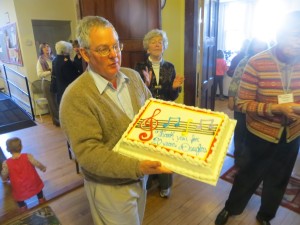Can we imagine our vocation as one of singing? Can we imagine singing as the facilitator of healing?
Here’s a story and a song, written by Jane Struss professional singer and our choral director and the Rev. Lyn G. Brakeman, a non-singer who sings anyway. Parts of both are excerpted from the Rt. Rev. Alan Gates’s sermon to the clergy of the diocese on Tuesday of Holy Week, a time when feelings of depletion and vocation-weariness threaten to overwhelm.
 The story. King Felipe V of Spain ruled in the early 1700s. He suffered from mental illness that caused him to howl into the night, become incontinent, play obsessively with clocks, and often go mute for weeks. Against all reason he was not deposed.
The story. King Felipe V of Spain ruled in the early 1700s. He suffered from mental illness that caused him to howl into the night, become incontinent, play obsessively with clocks, and often go mute for weeks. Against all reason he was not deposed.
Carlo Farinelli was an Italian-born singer who at ten was castrated to preserve his beautiful singing voice. Men like Farinelli were called castrati. Although cruel measures were taken, the sound of their singing had depth and power and a pure, genderless, ethereal sound.
Farinelli was persuaded by Queen Isabella to come to Spain to sing for the tormented king. The king met Farinelli and quickly sensed—that inner sense we often dismiss but that sometimes turns out to be a nudge from the Holy Spirit—a bond in circumstance.
Both men were made to be who they were against their will—robbed of normality. Heavy expectations were heaped upon them by families, public, even God. Farinelli’s singing penetrated the king’s madness with its beauty, gradually healing his isolation, even reconciling him to the impossibility of his vocation. As for Farinelli, he sang the king to his senses, himself to pride of purpose in his vocation.
Music evokes truth, love, and beauty. It calls us forth. Beauty reminded the king that his circumstance was not that for which he was created. Truth lifted him outside of his unnatural gloom. Love sang him to his senses.
The song. Farinelli had exceptional quality of voice, yes, but singing and song do not depend on that alone. Anyone can sing. Sing without music or without. Sing quietly to yourself, when you need it. Sing out strong to your people, for encouragement. Sing out loud to the world, for its healing. Sing a song of grief. Sing for joy. Sing in groups or alone. Sing in your mind when you lie awake at 3 a.m. with anxiety and no solutions.
The bishop’s night-song he learned as a young teen is based on Psalm 104:34-37. It is silent; it swells and carries him along. It fixes nothing, but like Farinelli’s singing it soothes—like the Breath in a divine lullaby.
I shall sing unto the Lord as long as I love,
I will sing praise to my God while I have my being;
My meditation of him shall be sweet,
I will be glad, I will be glad in the Lord.
There is a child about eight in our neighborhood. As she waits for the school bus to arrive she sings and sings and sings, softly and loudly to herself. I don’t know what she sings or why. I don’t care. Her song is prayer.
And one we often sing that Farinelli and the king might have sung. It’s a song about singing, the words written in the 17th century: My song is love unknown.
How crucial it is now that we sing a song of beauty truth and love to a world that is scared to death, a world that seems to have lost its mind, a world that needs restoration, redemption—Christ.
Sing God’s Beauty. Act in Love.


